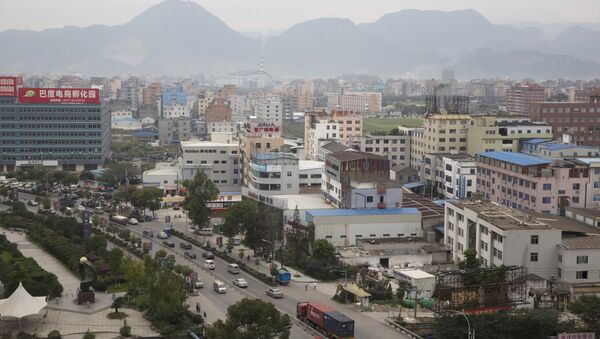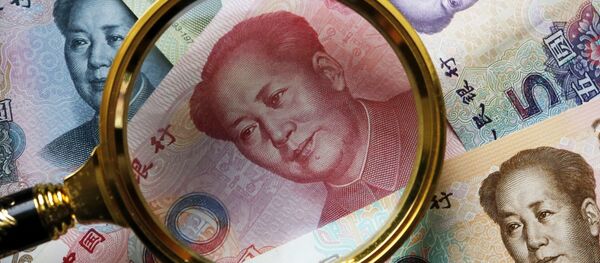As US President Donald Trump threatened to slap steep tariffs on Chinese exports to the United States worth up to $150 billion, Chinese authorities vowed to retaliate against US exports to China with a matching value. After trading harsh threats against each other, both sides agreed to hold talks in an effort resolve their differences.
A high-level US delegation, led by Treasury Secretary Steve Mnuchin, Commerce Secretary Wilbur Ross, Trade Representative Robert Lighthizer and National Economic Council Director Larry Kudlow, is expected to arrive in Beijing on Thursday to hold talks with top Chinese leaders for two days. Chinese President Xi Jinping, Vice President Wang Qishan and Vice Premier Liu He, who is Xi's top economic adviser, are expected to meet with the US delegation.
READ MORE: Trade War With China Will Have a Boomerang Effect, Hit US Interests – Analyst
Heavy Government Subsidies
Despite Trump often stressing the astronomical annual US trade deficit against China, which reached a record high of $375 billion in 2017, one of the main complaints from the United States relates to Chinese industry policies that offer government subsidies to help cultivate growth in certain industries and boost their competitiveness globally, economists told Sputnik.
"There is a point of view in the United States that believes Chinese companies have become competitive internationally and squeezed the market space of US companies both in China and globally, primarily because of the nation’s industry policies. Accusing China of ‘excessive state intervention’ or ‘national capitalism’ has become very common in the United States," Tu Xinquan, dean of China Institute for WTO Studies, the University of International Business and Economics in Beijing, told Sputnik.
READ MORE: Tokyo to Host Summit With Chinese, South Korean Top Politicians on May 9
However, the Chinese economist argued that it is impossible for the Chinese government to alter such policies fundamentally.
"From China’s perspective, strengthening the government’s investment has been the predetermined direction [for many industries] that cannot be changed. From the Chinese government’s point of view, it’s impossible to have innovation without investments from the state. We can never rely on the companies alone to innovate, especially in high-tech industries. If the United States believes we cannot have industry policies that offer subsidies, such issues will be difficult to be resolved [during the negotiations]," he said.
New Industries
Tu acknowledged that certain Chinese industries, such as the solar panel industry, have benefited greatly from subsidies from the Chinese government, allowing Chinese companies to dominate in the global market.
"It’s true that certain Chinese industries, under assistance from the nation’s industry policies, have become threats to US companies. For example, in the new energy sector, especially solar panels, Chinese government’s intervention was very obvious and the results looked to be optimal. In the solar panel industry, Chinese companies have enjoyed leading market shares both domestically and globally," he said.
READ MORE: China Has Plan of Action Amid US Trade 'Unilateralism', Ready to Take Measures
The Chinese scholar pointed out that the new industries are the exact areas where US companies seek to dominate in the future.
"In these new industries, the United States has become more and more concerned of state intervention from the Chinese government. That’s because those new industries, including electric vehicles, artificial intelligence and drones, are also the areas where the United States hopes to take the lead. They believe subsidies from the Chinese government have twisted market conditions in these new industries," Tu said.
The expert suggested that both sides should try to resolve the dispute under the framework of the World Trade Organization, which has specific rules on government subsidies.
In the proposed list of 1,300 Chinese products targeted in the Trump administration’s new tariff scheme, prominent Chinese exports to the United States, such as consumer electronics and clothing, were excluded. Reducing Chinese exports in those sectors would also have a huge impact on the consumer market in the United States, Tu explained.
"Restriction on Chinese exports in these sectors would have a major impact on the US consumer market. The United States relies on China heavily for a supply of consumer products. If they don’t buy from China, where else can they buy from? Which country can produce in such quantities? They don’t want to see a negative impact on inflation in the United States. That’s why they picked a list of products very carefully to minimize the impact on US consumers," he said.
READ MORE: 'President Trump is Probably Using Tariffs as Negotiating Tactics' – Prof.
Instead of reducing Chinese exports to the United States, China could import more US commodities to help offset the trade imbalances between the two nations, the expert added.
"The United States has almost become a third world country today. Its exports of commodities, such as crude oil, natural gas, mineral resources and agricultural products, have a lot of room for growth. And Chinese government could also play a large role in the trade of commodities, by encouraging the few Chinese state-owned enterprises to sign longer contracts with their US partners. China is also in need of natural resources. That’s why it’s technically possible to reduce China’s trade surplus with the United States," he said.
Different from Japan
Chinese economists argued that it would be difficult for the United States duplicate its success in the trade dispute with Japan in the 1980s when it forced the Japanese side to make large concessions by raising the value of the Japanese Yen and hurting the competitiveness of Japanese exports.
"China is very different from Japan because we have a massive domestic market and the government has been promoting the development of domestic consumption. China does not need to rely on the US market and can develop well based on its domestic market, as well as other markets in Europe, Asia and Africa. The United States only has a population of about 300 million. If China can work with other nations successfully, it can push the United States to the sidelines. On the contrary, the Chinese market with a population of over 1.3 billion is attractive to any country in the world today," Zhao Xijun, a finance professor with the Renmin University of China in Beijing, told Sputnik.
READ MORE: Psychological Warfare: US, Australia's Anti-China Lobbies Team Up – Scholars
The Chinese scholar said he is not optimistic about the negotiations in Beijing this week, because the bargaining from both sides would be a very long and difficult process.
The views and opinions expressed in this article are solely those of the speakers and do not necessarily reflect those of Sputnik.




